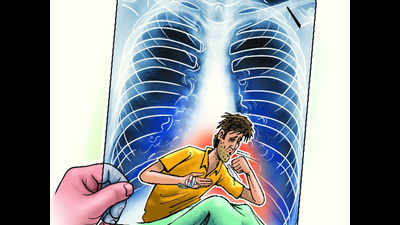- News
- City News
- Hyderabad News
- As open spaces shrink, diabetes, obesity, fatty liver disease soar
Trending
This story is from October 30, 2017
As open spaces shrink, diabetes, obesity, fatty liver disease soar

Representative image
HYDERABAD: Acute shortage of open spaces for physical activity is taking a toll on the health of citizens, with chronic conditions like obesity , diabetes and fatty liver disease rising among people.
While the World Health Organization (WHO) estimates that 16 million people are falling prey to lifestyle diseases every year, medical experts in the city say a green park or a proper walkway can go a long way in encouraging people to exercise, especially when majority of Hyderabadis are leading a sedentary lifestyle.“To persuade a person to leave a smart phone, heshe needs a lot of motivation. If a park with facilities like walking tracks and jogging tracks is created by the government, people would frequent that place, thereby improving their health,“ said Dr K Sreekanth, chief surgical oncologist, Yashoda Hospital, Somajiguda.
Dr K Sreekanth added, “To get motivated, a person needs the right stimulus like a beautiful place with facilities to work out.“
But with only a dismal 2.6% green cover and less than 4% of open spaces available in the city, citizens do not have any choice but stay put indoors. “I am a borderline case of diabetes and to keep my sugar levels under control, doctors have asked me to walk every day to help me keep the disease at bay.
“After twisting my leg after tripping and falling into a pothole, I decided to skip the idea totally,“ added Pranav Sai of Ameerpet, where Metro work is underway in full swing.
While the World Health Organization (WHO) estimates that 16 million people are falling prey to lifestyle diseases every year, medical experts in the city say a green park or a proper walkway can go a long way in encouraging people to exercise, especially when majority of Hyderabadis are leading a sedentary lifestyle.“To persuade a person to leave a smart phone, heshe needs a lot of motivation. If a park with facilities like walking tracks and jogging tracks is created by the government, people would frequent that place, thereby improving their health,“ said Dr K Sreekanth, chief surgical oncologist, Yashoda Hospital, Somajiguda.
Dr K Sreekanth added, “To get motivated, a person needs the right stimulus like a beautiful place with facilities to work out.“
But with only a dismal 2.6% green cover and less than 4% of open spaces available in the city, citizens do not have any choice but stay put indoors. “I am a borderline case of diabetes and to keep my sugar levels under control, doctors have asked me to walk every day to help me keep the disease at bay.
“But forget parks, we don't even have walkways these days, with the constant digging going on all around us,“ said Bala Murli Kirshna, 53, a banker and resident of Kondapur.
“After twisting my leg after tripping and falling into a pothole, I decided to skip the idea totally,“ added Pranav Sai of Ameerpet, where Metro work is underway in full swing.
End of Article
FOLLOW US ON SOCIAL MEDIA











